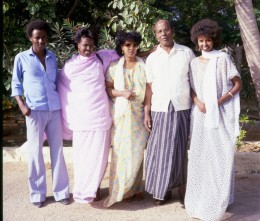Giving To Family Beyond Your Parents

One of my roommates in college, a sweet though also sharply intelligent, underestimate-her-at-your-peril kind of Midwesterner, told me that she worked throughout high school and was expected to hand over some of her earnings to her parents. She was calm about it, shrugged. That was simply how things were done. I wondered: was she good-hearted because her parents asked a lot of her, or did her parents ask a lot of her because she was good-hearted? Or both?
No one knows exactly how to raise compassionate, generous children. It does seem to help, though, to teach kids from a young age not to get too attached to money, even to the money they themselves earn. It sets an example, creates a habit, especially if you, the parent, can model generosity. Not an easy thing, to be sure; and if generosity wasn’t modeled for you, perhaps almost impossible.
Easier, though, perhaps, if you have religion to guide you through it.
Consider this Buzzfeed essay by Sarah Hagi, “My Negative Fortune,” about an ex-pat Somali community in Canada passing on the tradition of remittance, or sending money to one’s relatives abroad:
My parents didn’t need to sit me down for “the talk.” We’re Muslim, and one of the major tenets of our religion is charity. Charity, we are often told, does not decrease wealth. Meaning: If you were in a position to give, your status would always be elevated in the eyes of God. If you were in a position to spread your wealth, it was an honor.
Once I had been working more steadily for a couple of years, my mom began to ask how much I had in my account. I was 17, and my fast-food habit meant there wasn’t much left over before my next paycheck. She never had to force me; it was very much a “give what you can” request. I didn’t always know who the recipient would be or what they needed it for, but I trusted my mom wouldn’t ask us to give away our hard-earned money for no reason. Sometimes, I would hear what happened with the money sent — anywhere between $50 to $350 depending on how much we made — but usually I would forget all about it by the time it had reached whoever it was that called.
In one case, Hagi recounts, she is asked to send cash to her grandmother. “By the time the money had reached her, my grandmother had died of natural causes. The money was used for her burial.”
My family operated in a straightforward, benevolently patriarchal way over the course of my childhood. My father and my mother both earned salaries, though we knew my dad got paid more. They gave money to us, the children. We were not expected to work, let alone to contribute financially to the household; our job was to study and get good grades and not get in trouble and make our parents proud.
We did not talk about money very much, though we children knew we could get it if we asked: from Mom, because to some degree she felt guilty about working full-time; and from Dad, because it was so important to him to be generous. It was part of his identity to be open-handed, a way in which he differentiated himself from his own tight-fisted father.
Because everyone knew I, especially, could get anything from my father, my brothers called me, without much malice, “the princess.” I resented that, since I never pressed my advantage; hyper-aware of my power, I refused to use it, asking only for books and things it made Dad happy to give me. Still: “the princess.” They knew it pushed my buttons and after all, isn’t that what siblings are for?
After my father died, some of those family walls crumbled. Those of us who were left talked about money more frankly than we ever had before, and money itself flowed in more directions, not merely from the top down. My brothers and I helped out each other, as well as our mom.
Hagi’s right: it was an honor. I had never felt as much like I really had money as I did when I began sharing it with my family. I had donated to charity, of course; but it was being able to open my wallet to the people I was close to that made me feel not merely generous but rich. Once I could give and not merely receive, I wasn’t “the princess” anymore. I was a fully-fledged, on-equal-footing human being. A grown up.
Image via Vintage Somalia
Support The Billfold
The Billfold continues to exist thanks to support from our readers. Help us continue to do our work by making a monthly pledge on Patreon or a one-time-only contribution through PayPal.
Comments